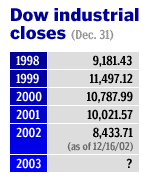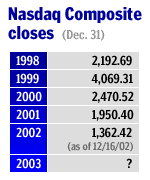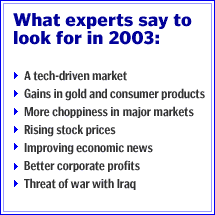NEW YORK (CNN/Money) -
Pity the poor investor. The markets are set to log losses for the third consecutive year in 2002, hurt by a weak economy, tepid corporate earnings and the lingering prospects of war with Iraq.

Which means stocks will be ready to bounce back big time in 2003, right? Not so fast, veteran money managers and market experts say. The new year could prove to be mediocre for the financial markets as the economy struggles to mount a meaningful recovery from the recession of 2001.
"I think sentiment will improve steadily, but we're in no way at the beginning of a great bull market," said John Bollinger, technical analyst and stock market strategist with Bollinger Capital Management. "The market is at the beginning of a long process."
The market's major indexes were all set to end lower this year for the third year running, the first time this has happened since 1941. The Dow Jones industrial average was off about 14 percent as of Dec. 16, while the Nasdaq composite had fallen 28 percent and the Standard & Poor's index was down 21 percent.
The last time the Dow and S&P registered declines for four years running was from 1929 to 1932 -- starting with the two-day stock market crash in October 1929 that helped usher in the Great Depression. The Nasdaq market did not yet exist.
Bullish on techs?
While tech stocks have floundered over the past three years, many analysts say this sector is set to rally and outperform other sectors of the market in 2003.

"I now feel more strongly than ever that the Dow Jones industrials and the blue chips will bear the lion's share of the brunt of the leg down," said Bernie Schaeffer, chairman of Schaeffer Investment Research. "And while the IBMs and the Dells and the Microsofts of the world may also get hit hard, there may be enough strength in the smaller-cap tech names to keep the Nasdaq composite on a relatively even keel -- even if the blue chips implode."
Since hitting lows on Oct. 9, the tech-laden Nasdaq has gained about 22 percent, while the Dow is up 16 percent from its lows and the S&P has risen 15 percent.
Experts said that some of the small- to mid-cap tech stocks could prove to be real bargains and that, eventually, the psychological aspect of investing in stocks -- the worry that one won't get into the market before the next big rally -- will catch up with investors.
Another factor in the predicted strength in techs is the possibility that fundamentals might surpass expectations. While analysts aren't necessarily suggesting huge earnings gains, if any at all, they think the smaller-cap companies could beat forecasts -- giving a boost to those stocks.
"Some investors might see value in these names ... and the tables are set for the fundamentals to be better than what's been factored in," said Todd Salamone, vice president of research at Schaeffer Investment Research.
Meanwhile, companies have begun buying computers again. According to the Commerce Department, American businesses increased technology outlays by an annualized 10.3 percent in the third quarter. Also, chip equipment makers say that they have seen increased demand -- which could be a sign that demand for other tech gear is about to pick up.
Beyond techs, experts said they see gold stocks rising, as investors hedge their bets against rising inflation or a major meltdown in the economy. The metal hit its highest level since June 1997 at $341.25 an ounce Tuesday as investors headed for a safer investment in the wake of falling stocks and weakness in the dollar.
They also said to watch some of the more defensive sectors including consumer products, especially casual dining. As people continue to stay close to home, experts bet that the products they use, and places they dine, will do well.
Choppy seas just won't calm
The market appears to be seeking direction, meaning more choppiness ahead. Most analysts think the volatile trading of yore also will define market activity in the new year.
"I think stock prices will be positive going into 2003. But in the consolidation period, the buy-and-hold strategy really doesn't work and investors really won't be adopting that strategy in 2003 either," Bollinger said.

Some experts expect the new year to bring slowly improving economic news, better corporate profits and, thus, rising stock prices. Several issues likely will have a strong impact on where the economy goes from here, including the possibility of a Fed interest rate hike, whether businesses start spending again, and what economic stimulus package Congress eventually passes.
A recent Bond Market Association survey found economists, on average, think gross domestic product will grow at a 3.4 percent annual rate in 2003, compared with estimated growth of 2.8 percent in 2002. GDP is the broadest measure of the nation's economy.
But a war with Iraq -- if it happens -- would threaten this rosy scenario.
For much of the past year, investors have been worrying that oil prices would soar if the United States were to go to war in, or near, the Middle East. Higher oil prices would probably hurt the economy, putting a big roadblock in front of any recovery in corporate profits, and stock prices.
"The biggest risk, I think, will continue to be on the geopolitical front," said James Awad, chairman and market strategist at Awad Asset Management. "With Iraq, the question will be how long will it take to win the war and what will we do with the victory."
And analysts don't expect high oil prices to reverse any time soon -- save a resolution of political issues between Iraq, the United States and the United Nations. The White House said Wednesday that Iraq's 12,000-page weapons declaration to the United Nations was Saddam Hussein's "last chance" -- leading many investors to believe the report is not the beginning of the end.
Oil prices could fall "only if we have some sort of settlement or a decisive victory in the Middle East," Scott Hess, a trader at G&H Commodities, told CNNfn. "And until we have that, I think we are going to maintain lofty prices."

-- CNN/Money Staff Writer Parija Bhatnagar contributed to this report.
|

